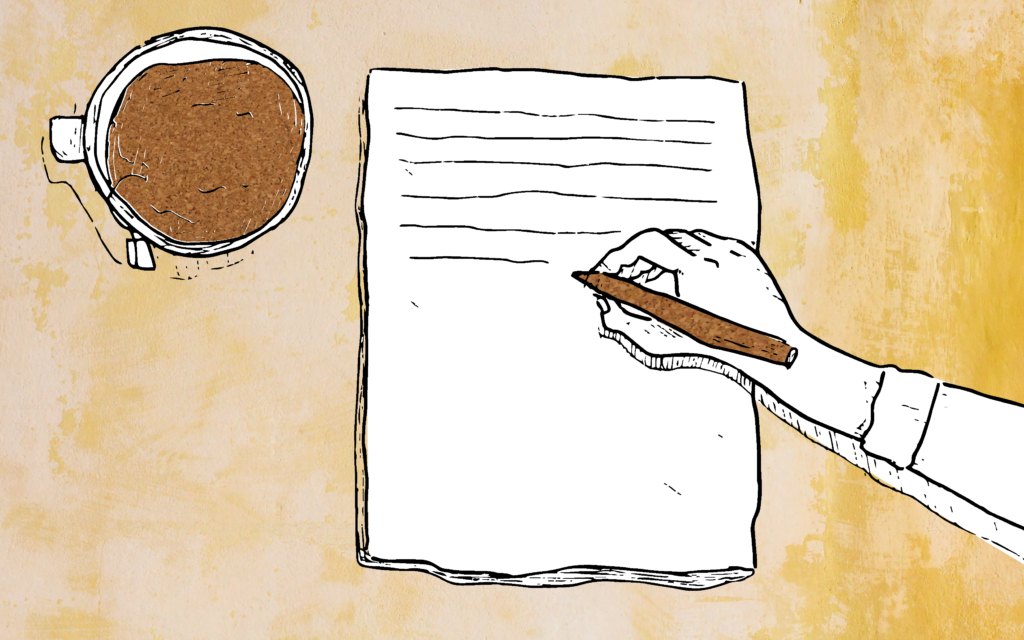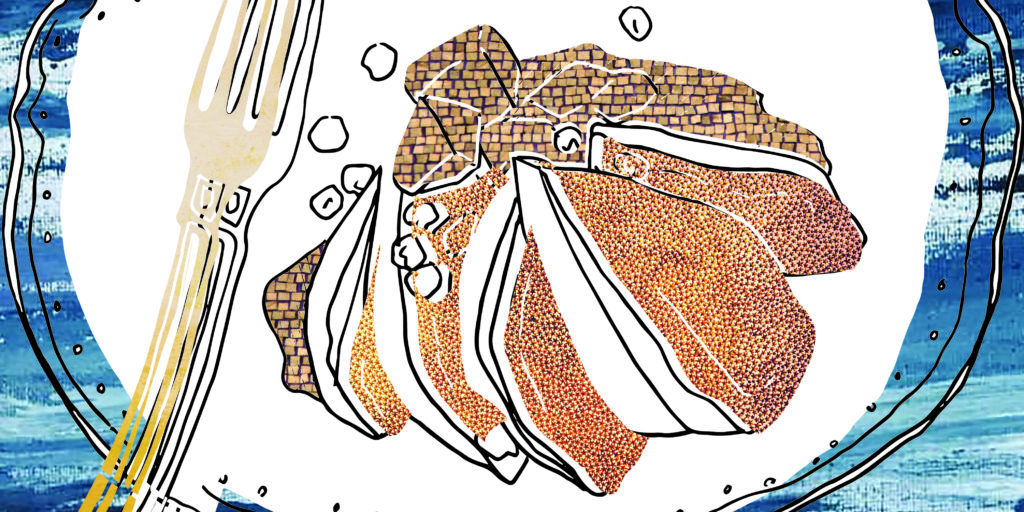My mother, Olga, who died in 2015 at age 95, was a great talker and storyteller. I recall waiting for my father with her as a small child in a double-parked car under the elevated train on Roosevelt Avenue in Jackson Heights while she invented names for each person entering a candy store. A woman with a bouffant hairdo was dubbed, “Madame Poof!” She was also a great reader. She briefly attended CCNY, loved poetry, and had me memorize passages of Kipling’s “Gunga Din” and Wilde’s “The Ballad of Reading Gaol,” with its refrain, “Each man kills the thing he loves” — an odd and complex concept for a child — and yet it instilled in me a love of the rhythms of language. She worked as a secretary at the Associated Press where, through her connections, I held clerical jobs during college and, later, wrote reviews for their book pages. My mother also had an inventive vaudevillian side and, at parties, would dance while singing “We’re in the Money” in pig Latin. She was never actually “in the money,” but for one weekend in her life, she entered the world of those who overflowed with it.
Her experience told me something I did not know about her: she was also a writer.
I don’t have many keepsakes or relics of my heritage: a pinkie ring from my father, of English ancestry, and who did not finish the 6th grade. And I have only scant items from my mother’s side, the Italian family I grew up with in Queens. An only child, I was raised in the upstairs apartment of a two-story railroad flat by my parents; my grandmother and two aunts lived on the first floor, but we ate meals together and formed one household. The fragrance of frying onions and peppers filled both floors from late afternoon until dinner.
I have in front of me a worn brown envelope containing a paper trail of the Bertolotti family — cardboard-backed photographs of my great uncles and grandparents posed before a studio backdrop; my Aunt Linda’s will; bills from the Perazzo funeral home; St. Joan of Arc’s announcement of my parents’ banns of marriage; an envelope containing a 1904 Indian Head penny; death certificates; a card recognizing my first Holy Communion; the manifest of the passenger ship, Kaiser Wilhelm II, showing that my grandfather and grandmother, Giuseppe and Teodolinda Bertolotti, arrived on Ellis Island in 1897, and finally, a newspaper clipping of my grandfather’s death in 1928: Roofer Killed in 6-Story Fall, which documents his fatal accident on the roof of the National Sugar Refinery in New Jersey, where he “landed on a railroad car filled with pig iron.” My grandmother, 28, was left to raise my mother (age eight); my aunts, Mae, Linda, and Louise; and four sons: Fred, John, Dominic and Primo.
Standing out from this varied archive is a handwritten letter in its envelope from my mother which she sent to her mother and sisters (“Dear Mom and Everyone”) in 1943 from San Francisco, where she had just moved with my father who he was assigned to duty there as a sailor in the Navy. World War II was in its fourth year.
Eight long pages! And a ninth with a postscript! All in that distinctive cursive taught by the Dominican nuns of St. Bartholomew’s School in Elmhurst, which I also attended.
Why is this letter dear to me? Because it contains all the wonder, naivete, and hopes of my mother at 24, newly married and recently arrived in the west after spending a weekend seeing a side of the world known only by a privileged few. And more importantly, it shows a class divide that this daughter of immigrants was aware of in only the most innocent way: she found the fruits of the capitalist playground something wonderful and to be aspired to, but never within her grasp. For years, she used to say, in a breathy, appreciative way, that some resort or restaurant was “exclusive,” which I, as a child believed to be synonymous with “the best,” and not the opposite of “inclusive.” Her letter is punctuated with phrases such as, “gosh” and “swell,” revealing her starstruck state of mind.
It also reveals my mother as a writer.

The occasion for the letter was, as she states in the opening paragraph, “something so different from what we have ever experienced.” Through one of his shipmates, my father had become friends with the caretakers of “The Joice Island Duck Club,” a hunter’s refuge on an island, “owned by eight multi-millionaires.” The wide-eyed innocence of the newlywed suddenly walking in the footsteps of the super-rich is both touching and telling.
Her letter is a chronological narrative of her weekend. Very much like a novelist confiding in readers, she opens with a tone both intimate and inviting: “I don’t want you to miss anything, so I shall start right from the beginning.”
She and my father were picked up by their friends at their apartment in San Francisco’s Chinatown at nightfall and driven to a dock on Grizzly Bay where they boarded a motorboat that took them to the island. Of the trip across the water, she writes, “it seemed as if the whole sky was composed of just moon and stars and nothing in between.” They pass other islands, which are also the sites of private hunting clubs until she sees “a bright light shining from a tower and a windmill. It was Joice Island.”
In the club’s main building, they are greeted by three hunting dogs, and she notes the fireplace’s “crackling large oak logs.” She has never seen a picture window, so she does not call it that but, impressed by its size, says it is “about five feet wide and seven feet tall — all clear glass — no break in the center like our windows.” As if the windows in our tenement could in any way compare! It is not only the view of the open water that impresses her but the method of delivery: no break to disrupt the sweeping vista. She cannot help but harken back to her own windows at home, to connect her audience to the guide she has become, linking their world to this alien culture and showing them how it works.
Leather armchairs and sofas surround the fireplace. There is a wet bar and a groaning board and although she does not use those terms, she conveys the offerings she can recognize: “many kinds of liquors and a long table with several kinds of crackers and fancy dishes filled with cheese and ham.”
She is thrilled at being served duck for dinner (“we each had one whole one”) because, after all, the club is named for it. And they are served coffee “with cream — they get it by the quart — I don’t know how.” Mince pie also comes with “real whipped cream,” both dairy items noted because this was when these goods were strictly rationed to aid in the war effort, far out of reach of the average person. And probably illegal. Her admitted lack of understanding — “I don’t know how” — speaks volumes about class, privilege, and capitalism.
A “hired man” does the dishes after dinner; my mother has no other phrase for domestic help, housekeeper, or servant. Such terms are unknown to her.
At bedtime, my mother and father are shown to Mr. Collier’s room — “he is the President of the Standard Oil Company — how do you like that?”
She is amazed by the fact that she is occupying the oil tycoon’s room. It is amazing, and she repeats the word that in two other instances. She describes the four well-stocked refrigerators, and repeats what the caretakers told her were their instructions from the club members: “Spare no expense because when we want something, we expect it to be there.” My mother says they spend $500 a month on food, and adds, “Can you imagine that?” ($500 then is $7,000 today.) There are so many things here she cannot imagine, but she wants to convey the unimaginable to her mother and sisters; she hopes to give them a glance of her trip to the place she calls “Shangri-La.” At the conclusion of her story, she says, “Well, wasn’t that perfect?”
My mother’s letter mentions nothing of her daily life. Her narrative is devoted to a dreamscape.
And yet, reality appears. In a postscript. On a separate page. In this way, the romantic saga of her stay is isolated and preserved, very much like Joice Island itself.
In this addendum, she talks about her Chinatown apartment, lamenting that her radio will no longer broadcast due to a broken tube, which is a real loss, she explains, as my father has just been assigned to the 3 pm to 11 pm shift and she is alone in the evening. She says the repair man doesn’t know if he can find a replacement tube and they can’t afford a new radio. A far cry from the spare-no-expense economy of the Duck Club.
Yet there is a happy ending. She writes, “Mrs. McGuire, our landlord, came to our rescue.” The landlord had an extra radio that another tenant wasn’t using and gave it to my mother, telling her “not to spend money on a new one.”
The community on Sacramento Street is a world apart from that insular island of the very rich. “Money” is an issue and expenses are spared. There is an understanding between tenant and landlord that is poignant; Mrs. McGuire has a genuine concern for a couple just starting a life together. And in a phrase right out of the forties, my mother says of her benefactor, “Isn’t she a peach?”
My mother ends her narrative by saying, “Maybe you should keep this letter. Someday I might like to read it. I guess I should keep a diary out here, it might be fun to read sometime.”
There is a pride of ownership in what she has described. She wants her text preserved, first in her mother’s safe-keeping but then, on second thought, she wishes to preserve it for herself. A formal record. A diary. And perhaps a pleasure to read in later years. Implicit in this wish is the knowledge that the experience will not be repeated.
I was struck by her longing to be read in the future, even by herself. And now she has been read by her son, 77 years later, and also by you, reader, who has received the story of her weekend as surely as it had arrived in 1943, Via Airmail, at that railroad flat Queens.
Well, Mom, a lot of people are reading your story.
What do you think about that? •




